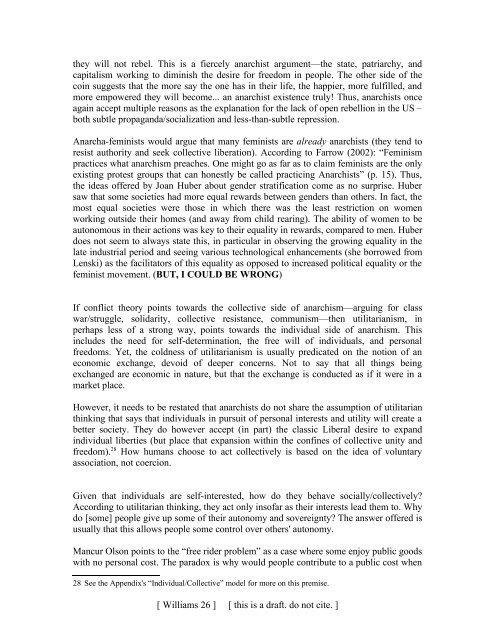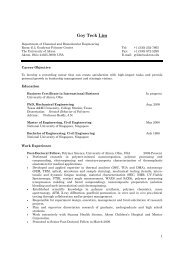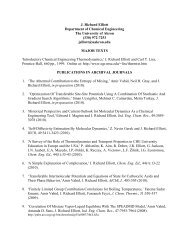Sociology of the Anarchists - Gozips.uakron.edu - The University of ...
Sociology of the Anarchists - Gozips.uakron.edu - The University of ...
Sociology of the Anarchists - Gozips.uakron.edu - The University of ...
You also want an ePaper? Increase the reach of your titles
YUMPU automatically turns print PDFs into web optimized ePapers that Google loves.
<strong>the</strong>y will not rebel. This is a fiercely anarchist argument—<strong>the</strong> state, patriarchy, and<br />
capitalism working to diminish <strong>the</strong> desire for freedom in people. <strong>The</strong> o<strong>the</strong>r side <strong>of</strong> <strong>the</strong><br />
coin suggests that <strong>the</strong> more say <strong>the</strong> one has in <strong>the</strong>ir life, <strong>the</strong> happier, more fulfilled, and<br />
more empowered <strong>the</strong>y will become... an anarchist existence truly! Thus, anarchists once<br />
again accept multiple reasons as <strong>the</strong> explanation for <strong>the</strong> lack <strong>of</strong> open rebellion in <strong>the</strong> US –<br />
both subtle propaganda/socialization and less-than-subtle repression.<br />
Anarcha-feminists would argue that many feminists are already anarchists (<strong>the</strong>y tend to<br />
resist authority and seek collective liberation). According to Farrow (2002): “Feminism<br />
practices what anarchism preaches. One might go as far as to claim feminists are <strong>the</strong> only<br />
existing protest groups that can honestly be called practicing <strong>Anarchists</strong>” (p. 15). Thus,<br />
<strong>the</strong> ideas <strong>of</strong>fered by Joan Huber about gender stratification come as no surprise. Huber<br />
saw that some societies had more equal rewards between genders than o<strong>the</strong>rs. In fact, <strong>the</strong><br />
most equal societies were those in which <strong>the</strong>re was <strong>the</strong> least restriction on women<br />
working outside <strong>the</strong>ir homes (and away from child rearing). <strong>The</strong> ability <strong>of</strong> women to be<br />
autonomous in <strong>the</strong>ir actions was key to <strong>the</strong>ir equality in rewards, compared to men. Huber<br />
does not seem to always state this, in particular in observing <strong>the</strong> growing equality in <strong>the</strong><br />
late industrial period and seeing various technological enhancements (she borrowed from<br />
Lenski) as <strong>the</strong> facilitators <strong>of</strong> this equality as opposed to increased political equality or <strong>the</strong><br />
feminist movement. (BUT, I COULD BE WRONG)<br />
If conflict <strong>the</strong>ory points towards <strong>the</strong> collective side <strong>of</strong> anarchism—arguing for class<br />
war/struggle, solidarity, collective resistance, communism—<strong>the</strong>n utilitarianism, in<br />
perhaps less <strong>of</strong> a strong way, points towards <strong>the</strong> individual side <strong>of</strong> anarchism. This<br />
includes <strong>the</strong> need for self-determination, <strong>the</strong> free will <strong>of</strong> individuals, and personal<br />
freedoms. Yet, <strong>the</strong> coldness <strong>of</strong> utilitarianism is usually predicated on <strong>the</strong> notion <strong>of</strong> an<br />
economic exchange, devoid <strong>of</strong> deeper concerns. Not to say that all things being<br />
exchanged are economic in nature, but that <strong>the</strong> exchange is conducted as if it were in a<br />
market place.<br />
However, it needs to be restated that anarchists do not share <strong>the</strong> assumption <strong>of</strong> utilitarian<br />
thinking that says that individuals in pursuit <strong>of</strong> personal interests and utility will create a<br />
better society. <strong>The</strong>y do however accept (in part) <strong>the</strong> classic Liberal desire to expand<br />
individual liberties (but place that expansion within <strong>the</strong> confines <strong>of</strong> collective unity and<br />
freedom). 28 How humans choose to act collectively is based on <strong>the</strong> idea <strong>of</strong> voluntary<br />
association, not coercion.<br />
Given that individuals are self-interested, how do <strong>the</strong>y behave socially/collectively?<br />
According to utilitarian thinking, <strong>the</strong>y act only ins<strong>of</strong>ar as <strong>the</strong>ir interests lead <strong>the</strong>m to. Why<br />
do [some] people give up some <strong>of</strong> <strong>the</strong>ir autonomy and sovereignty? <strong>The</strong> answer <strong>of</strong>fered is<br />
usually that this allows people some control over o<strong>the</strong>rs' autonomy.<br />
Mancur Olson points to <strong>the</strong> “free rider problem” as a case where some enjoy public goods<br />
with no personal cost. <strong>The</strong> paradox is why would people contribute to a public cost when<br />
28 See <strong>the</strong> Appendix's “Individual/Collective” model for more on this premise.<br />
[ Williams 26 ] [ this is a draft. do not cite. ]






